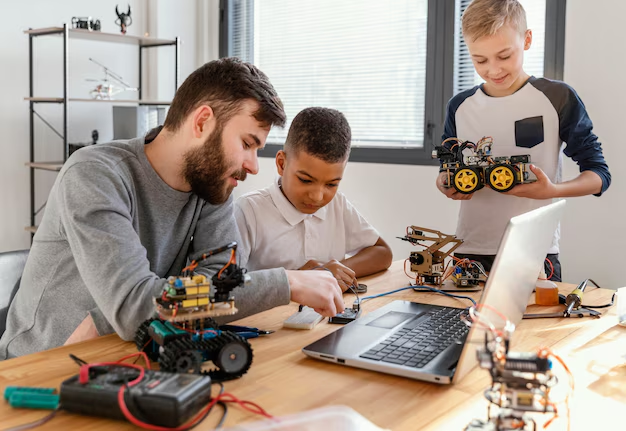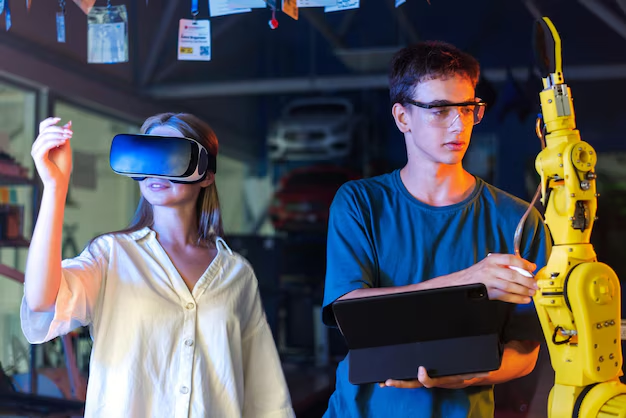As we enter the 21st century, robotics continues to transform every aspect of our lives. From the way we work to the way we live, robots are reshaping our world and driving innovation in industries across the globe. This article explores the critical role of robotics in modern society, its current and future applications, and the impact it has on industries ranging from healthcare and manufacturing to transportation and entertainment.
1. The Rise of Robotics: From Concept to Reality
Robots, once imagined as futuristic devices in science fiction, have evolved into sophisticated machines that now perform crucial tasks across various sectors. The transition from concepts in books and films to tangible, functional technologies is a monumental achievement.
Key Milestones in Robotics:
- Industrial Robotics: The introduction of robotic arms and assembly line robots in the 20th century revolutionized the manufacturing sector.
- Autonomous Systems: Advances in AI and machine learning have led to the development of autonomous robots capable of decision-making and self-navigation.
- Robotic Prototypes: Early robots like Unimate and Shakey paved the way for modern robotics, from factory automation to intelligent robots in everyday life.
2. The Impact of Robotics in Various Industries
Robotics has found applications across numerous industries, proving to be a transformative force that enhances efficiency, reduces costs, and improves safety.
Manufacturing and Industry:
In industrial settings, robotics is a game-changer. Robots are employed in automotive assembly lines, electronics manufacturing, and product packaging, performing tasks with precision, speed, and consistency that far exceed human capabilities. This leads to improved productivity, reduced human error, and greater flexibility in production processes.
- Robotic Arms: Common in automated factories for tasks like welding, painting, and assembly.
- Cobots (Collaborative Robots): Designed to work alongside human workers, cobots enhance human-machine collaboration in a variety of sectors.
Healthcare:
Robots in healthcare are significantly improving the quality of patient care and the efficiency of medical procedures. From robotic surgery to rehabilitation robots, the healthcare industry benefits from robotics in numerous ways.
- Robotic Surgery: Advanced robotic systems such as da Vinci Surgical Systems allow surgeons to perform minimally invasive procedures with greater precision.
- Exoskeletons: These wearable robots assist patients with mobility issues by providing physical support.
Agriculture:
The agricultural industry has embraced robotics to increase efficiency and productivity. Robots now assist with tasks like planting, harvesting, and monitoring crops.
- Autonomous Tractors: These machines can plant and harvest crops with minimal human intervention.
- Drones in Agriculture: Drones equipped with cameras and sensors help farmers monitor crop health, identify diseases, and optimize irrigation.
Transportation:
The future of transportation is also being shaped by robotics. Self-driving cars, delivery drones, and autonomous trucks are revolutionizing logistics, reducing costs, and improving the efficiency of goods transportation.
- Autonomous Vehicles: Companies like Tesla, Waymo, and Uber are leading the way in the development of self-driving cars.
- Drone Delivery: Companies like Amazon and UPS are experimenting with drone delivery to expedite package shipping.
3. Robotics in Everyday Life

Beyond industries, robots are becoming more integrated into our personal lives. Whether through robotic vacuum cleaners, personal assistants, or home automation systems, robots are providing convenience and enhancing daily living.
- Smart Homes: AI-powered robots manage home security, energy systems, and even offer personalized services.
- Personal Assistants: Devices like Amazon Alexa and Google Home use robotics and AI to assist with household tasks, entertainment, and communication.
4. The Role of Artificial Intelligence in Robotics
Artificial intelligence (AI) is at the heart of many modern robots. By enabling machines to learn, adapt, and improve their performance, AI is pushing the boundaries of what robots can achieve.
- Machine Learning: AI allows robots to learn from data, make decisions, and improve over time, making them more effective at performing complex tasks.
- Natural Language Processing: AI-powered robots can understand and process human language, enabling smoother human-robot interaction.
- Autonomous Robots: AI enables robots to navigate environments, recognize objects, and make decisions without human intervention, leading to increased automation in industries like logistics and healthcare.
5. The Future of Robotics: What Lies Ahead?
The future of robotics is bright, with continued advancements in AI, machine learning, and materials science. Some of the key developments we can expect in the coming years include:
- Robots in Space Exploration: Robotics will continue to play a significant role in space exploration, with autonomous robots deployed to explore distant planets and moons.
- Human-Robot Collaboration: The future of work will see humans and robots collaborating in increasingly advanced ways, with robots assisting in tasks that require precision, strength, or safety.
- AI-Enhanced Personal Robots: We may see robots that offer personalized services in homes, schools, and workplaces, powered by AI that adapts to the specific needs of individuals.
6. Challenges and Ethical Considerations
While robotics offers vast potential, it also presents challenges and ethical concerns that need to be addressed. Issues such as job displacement, data privacy, and the ethical treatment of robots are all critical topics that must be tackled as the field continues to evolve.
- Job Displacement: As robots take over more tasks traditionally performed by humans, there are concerns about the loss of jobs in industries like manufacturing, transportation, and healthcare.
- Data Privacy and Security: As robots collect vast amounts of personal data, ensuring that this data is protected and used responsibly is a growing concern.
- Ethical Robots: As robots become more autonomous, questions arise about accountability for their actions, especially in situations where robots make decisions that affect human lives.
Also Read : From Science Fiction to Reality: The Evolution of Robotics
Conclusion: Innovating The Future with Robotics
Robotics is no longer a futuristic concept; it is a present-day reality that is shaping modern society. From enhancing industries like manufacturing, healthcare, and transportation to improving daily life with smart robots, the role of robotics is undeniable. As technology continues to advance, the possibilities for robots to innovate and improve our world are endless. By addressing challenges and ethical concerns, robotics will continue to play a critical role in the evolution of modern society.
SEO Optimized Keywords:
- Role of robotics in modern society
- Future of robotics
- Robotics technology
- Artificial intelligence in robotics
- Robotics in healthcare
- Autonomous robots
- Robotics applications
- Collaborative robots
- Robotics in manufacturing
- Robots in everyday life
- Robotics in transportation
- Smart robots
- Robotics in agriculture
- Robotic surgery
- Robotic vacuum cleaners
- Future of work with robots
- Robotics and AI integration
- Robotics breakthroughs
- Ethical issues in robotics
- Autonomous vehicles
- Robotic trends
- Robotics innovations
- Machine learning and robotics
- Robotics in space exploration
- Robotics and automation
- AI-powered robots
- Human-robot collaboration
- Robotics applications in logistics
- Robotics in education
- Robotics in entertainment

